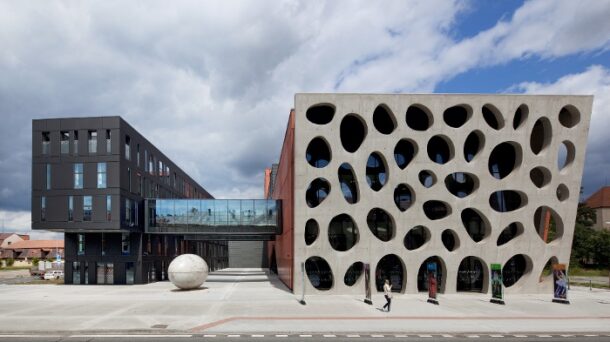By Kalina Stefanova
You may assume I mean back to the time before the pandemic. No. Back just few months ago – to the first part of September 2020, when the Pilsen International Theatre Festival took place. Not digitally or outdoors, neither in a shortened edition or a mixed digital-meets-real one. It transpired in a fully real, traditional manner, from the 10th till the 14th of September – the only large-scale festival in Eastern Europe that dared to undertake such a significant step this summer.
Importantly, the conditions at that moment happened to be on its side too. When I arrived in Pilsen two days before the opening, the city was declared mask-free on its municipality site, since the virus cases were very limited, and all indoor events had already been given a green-light. So what a delight it was indeed to see the faces of the colleagues, shake hands, and get freely together. The next day, though, the cases in Prague rose and, when the Festival started, the masks were back, yet only few other changes followed.
Of course, the Festival was not miraculously spared by the general situation. Several months earlier, 887, the one-man show of Robert Lepage, that was scheduled to open the event and present for the first time to the Czech viewers the work of the Quebecois theatre wizard, was cancelled. Yet during the Festival itself only two more shows got cancelled and they were immediately replaced. Ironically, one of them was entitled Tonight’s Performance is Cancelled – a production of the Slovak National Theatre in Bratislava, directed by Jiří Havelka, the Czech master of a documentary-based, yet not verbatim theatre. Frequent entries to the festival’s previous editions, his shows invariably manage to present our reality at once stunningly authentic, yet, from one point on, totally different – as on those drawings where all of a sudden we see something else there; something which makes them eye-opening in regard to our own presence in it. So the cancellation of this very show left a real void. However, Havelka did take part in the Festival, as a guest-speaker at a discussion devoted to the Czech-Slovak Theatre century, so one could at least listen to his first-hand account of the creation of Tonight’s Performance is Cancelled.
With the exception of these few last-minute changes, everything else went as planned and, were it not for the masks, one could easily even forget the pandemic. For in the theatres no seats were removed or left empty. Some of the halls were chamber and one of the shows took place with the audience on stage, i.e., as usually in such cases, the ambiance was really cozy, especially given it was really packed, as were most of the other shows too.
So, although I’ve never let the critic in me oust the ever enchanted by the theatre viewer, this time I relished as never before the mere sitting in the dark and feeling a part of the warm and pulsating body of the audience. After months on the mirage-like digital theatre diet, letting the energy of the live communion with all these people around me and on stage run through all my being was like finding oneself in an oasis. And I have to admit I was on the verge of entirely abandoning my critic’s hat and succumbing to the delight of merely experiencing theatre. I was ready to forgive any of its imperfections.
I didn’t need, though, since, as usual, the program of the Festival was selected with an impeccable taste. And also because one of the main treads that went through it was exactly an outright hats-off to the theatre art.
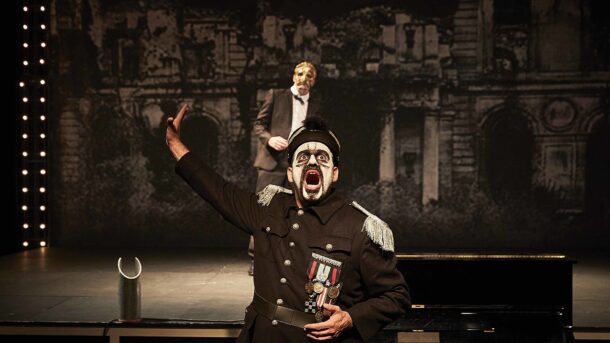
The Triumph of Love written and directed by Olivier Py. Photo: Avignon Festival.
A marvelous manifestation of this attitude was the French The Triumph of Love, a production of the Avignon Theatre Festival, directed by its head, Olivier Py, who has also written the text (in Alexandrines), based on the Grimm brothers’ Maid Maleen, and composed the music too.
The story in The Triumph of Love is rendered in something like an operetta style to the accompaniment of live music, played by a cast of four actors themselves. The stage is markedly small, with sets painted in an old-fashioned manner and a piano in front of it, underneath the proscenium. The actors shuttle up and down between the stage and the hall, while either relating the story en-face to the audience or enacting it with the implied understanding that we have to use our imagination to build up the rest of the picture. No obvious presence of the ubiquitous technique interferes in this communication. The actors are impressively versatile: some play two instruments and all of them act, dance and do mime acts equally well. All this brings a nostalgic feel, as if we are back in time and a traveling company has visited our town to play for us.
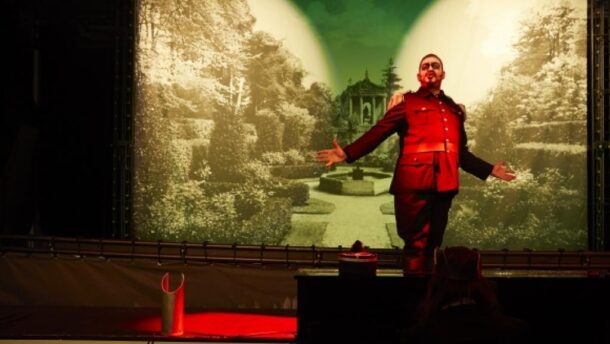
The Triumph of Love written and directed by Olivier Py. Photo: Avignon Festival.
The Triumph of Love exudes child-like pure innocence and disarming naivety, and feels like a refreshing splash of water on one’s face in the morning, transporting us far away from infantility, another ubiquitous trend today, as if it were just a nightmare.
There is one element in the show, though – photographs from war disasters – that, appearing from time to time on stage, reminds us that the nightmares of today are all too real and that it is this deliberately and brilliantly old-fashioned theatre that is more like a dream. Yet this is only an underlying streak and, maybe again because of the pandemic situation and the lucky crack in it that the Festival happened to be, I had a feeling that The Triumph of Love could equally be entitled The Triumph of Theatre.
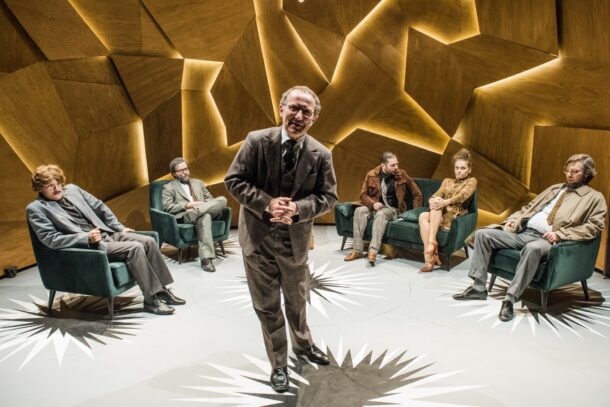
Don Quixote, directed by Jan Mikulášek. Photo: Pilsen Festival.
The most impressive of the Czech drama productions (the Festival presents a large selection of the traditionally excellent local puppet theatre too) was Don Quixote, directed by one of the most idiosyncratic directors, Jan Mikulášek, at the Goose on a String Theatre in Brno. It has nothing to do with the literary plot of Cervantes, yet has captured the essence of the spirit of his book as an existential take on life and life’s theatre, equally valid for today.
The action takes place in a small TV studio where guests are invited to discuss Don Quixote and other themes. The first discussion is so to speak fuller-scale and the audience is presented with hilariously funny archetypical characters in the face of the guests. The next scenes get shorter and shorter, while the semi-circular stage rotates, changing the array of guests, and, as if in the maddening tempo of TV and of contemporary life on the whole, it becomes something like a merry-go-round where sketches of recognizable and very funny characters dash before us.
Since the audience is on stage too, the feeling is like watching through a gigantic kaleidoscope. Only, instead of beautiful figures, in there is a set of changing distorted mirrors with caricatures of human types and behaviours – epitomes of stupidity, pretentiousness, emptiness, ambition, etc.
At the center of all this is a TV host who in the beginning seems as a part of the whole craze; then all of a sudden he literally stops the swirl and shows a photo of a woman, whom he met when they were young, pleading to her to call him. He does this several times and it is always like a stop-motion, as if putting on hold the rest of the action – and of the whole surrounding world –and opening the door to a parallel universe where things are very different and where purity, longing, and love still reside and make sense. When the woman does eventually call and even shows up in the TV studio, though, she turns out to be already very different from his memory/dream and this parallel universe loses its allure at least for a while.
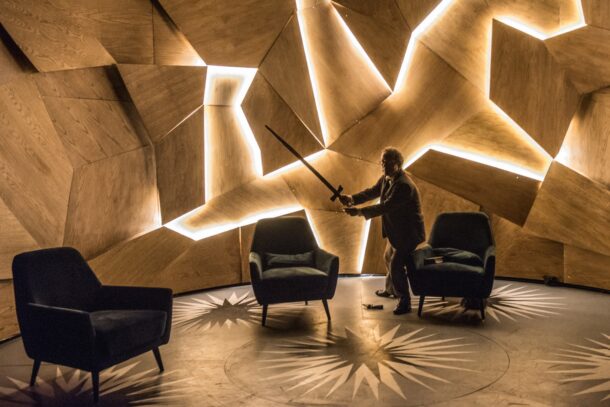
Don Quixote, directed by Jan Mikulášek. Photo: Pilsen Festival.
Nevertheless, it is this character, played brilliantly by Dušan Hřebíček, that manages to be not just a counterpoint to the rest but sort of a gravity center that invisibly holds everything together, not letting the increasingly centrifugal motion (in figurative terms) – another ubiquitous feature of our time – make his surrounding world break into pieces and fly away. Visually an antidote to the classical image of Don Qixote, more like Sancho Pansa actually, it is this character who brings in the Don Quixotian essence here, the ability to preserve purity in the midst of a degraded humanity that is already taken as a norm. Or maybe each of the other characters too have such stop-motion moments when from two-dimensional caricatures they become human beings with preserved deep down personal gravity center; only this remains invisible to us…
I have seen several productions of Mikulášek, a master of grotesque and refined hyper-stylization, yet here as never before I felt a much more palpable presence of a kernel of humanity deep down in his work – something which made to me this Don Qixote of his equally funny and moving, very moving.
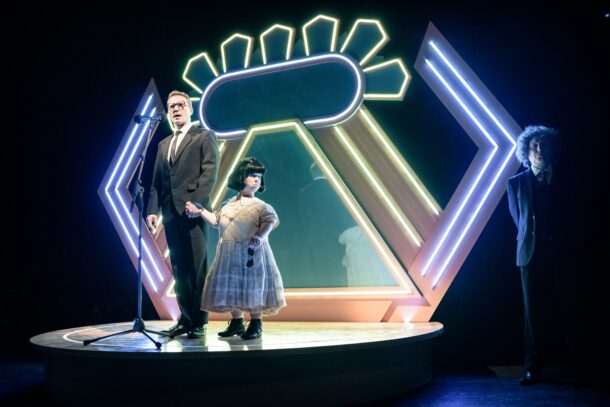
I Am the State, by Vincent Macaigne, directed by Jan Mikulášek. Photo: Prague National Theatre.
Also directed by Mikulášek was the production that opened the Festival: I Am the State of the National Theatre – Drama Section in Prague, which was performed just two days after its premiere. It set the tone on a very topical note: the apocalyptic state of the world.
The very opposite of Don Quixote’s compactness, it spills over the stage from the very start, donning briefly the shape of something like a popular-music concert. Assured by sort of an MC that we are in the right place at the right time, the audience is invited to enjoy themselves, stand up, dance and be happy despite the very difficult times. The “have-fun” mantra valid until just before the pandemic – a mantra which has almost managed to substitute or even displace the “be-good” principle – here resounds ever more absurdly. For the time when the action takes place is in a not-so-far and not-so-impossibly dystopian future, when, as we are informed, 52 countries have disappeared, the natural resources have been exhausted, there is little water left and everyone has lost a close one. So the audience is invited to keep a minute of silence for Italy, Sweden, etc, and, after each such minute, a popular song from the respective country is played by a band in corona-like protective costumes – as a requiem; and also lest we forget the entertainment is what we are here for.
The play – by Vincent Macaigne, a French actor and director – is from then on a mish-mash of references to politics, TV and the entertainment industry, the reality formats, myths, etc. rather loosely interwoven into an absurd fable that can easily finish much earlier than it does. And even the talent of Mikulášek, helped with a great cast, doesn’t seem to be able to put reins to all this and compensate for the feeling of a lost measure. At the same time, the many-ness is so typical a trait of our time, and so much at the core of the problems of our world and of the one the play and the show depict, that the spilling of the show over and over again could be taken as part of its overt political and allegorical nature.
I Am the State reminded me of a show I saw back in 2002, in Egypt, at the Festival of Experimental theatre: The Al-Hamlet Summit, directed by Sulaiman Al-Bassam, which depicted a world so much like ours today, yet back then it seemed too far-fetched. I do hope I’m the State does not turn out to be that prophetic 20 years from now. Or rather, I do hope that it helps at least in its own way that we do not get our world into such a state as the show warns us we could very well do.
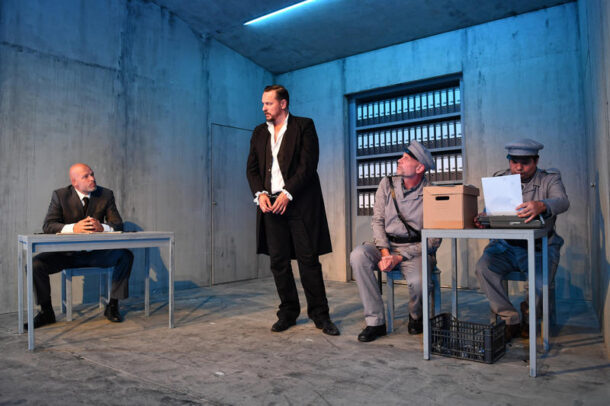
The Beggar’s Opera, by Václav Havel, directed by Hana Burešová. Photo: Brno City Theatre.
The Festival’s closing production – The Beggar’s Opera by Václav Havel, directed by Hana Burešová at the Brno City Theatre – was also with political implications. Even more concretely: with “contemporary relevance to our putrid Babišland,” as one of the Czech critics, Vladimir Just, quoted in the Festival’s program, found it.
Yet here this is not on the direct-statements level but is more of a subdued undertone embedded in a playful, overtly this-is-theatre traditional frame. From the deliberately uniform sets that after just few changes fit the different scenes and the casting of one and the same actress in the roles of the two rivals’ wives, again with a slight change in the costume and appearance only, to the deliberate clichés in the acting style and costumes, and the direct reverences to the audience. So this production of The Beggar’s Opera gathers in a very fine way the politically topical with, once again, a celebration-of-the-theatre approach.
The latter came as a fitting continuation of the brief closing ceremony held just before the show and comprising several very short speeches and a long standing ovation for the star of the evening – the Festival’s team. “It was extremely hard to organize the Festival,” said Jan Burian, its director. “There were all sorts of complications. If it were not for the great organizing team, it would not have been possible for the Festival to be pulled off. All the more we need to acknowledge their work.”
The Pilsen Festival has never been a pompous and ostentatiously glitzy event. Quite the opposite: refraining from any fanfares and investing its energy exclusively in assuring high quality and professionalism has been its trademark for the nearly three decades of its existence. Maybe this tradition of not wasting any energy into aside and façade things helped it manage to take place during this so theatre-unfriendly year too.
Of course, the unwavering support of the Pilsen region and municipality has also been an important factor. Pilsen’s mayor of several mandates, Martin Baxa, who throughout the years could often be spotted among the audience of the Festival’s evening and weekend shows, was very kind to dwell on this year’s special edition, in an exchange of correspondence after the event. “The general prosperity and commitment to arts in our city is a very important chapter of the city’s development strategy”, he wrote. “Since 2001, when the Pilsen City Council approved the so-called Basic Document on the Cultural Policy (one of the first cultural strategies in the Czech Republic), Pilsen has been applying a systematic approach to the support of culture in the city, including the subsidy policy. … culture is a significant and irreplaceable part of the citizens’ lives and …lasting and consistent care for culture is one of the basic standards of human society and helps its development. This systemic concept was among the reasons Pilsen was awarded the prestigious European Capital of Culture 2015 title.”
It was exactly back then, when Pilsen opened a new, large theatre, with two stages, thus becoming one of the very few Eastern European cities who have managed to gain such an asset during the last five years. And it is in this theatre where the Festival headquarters have since then been residing and where a lot of its shows get presented, along with four more theatres in the city.
“Because we consider the International Theatre Festival the most significant international cultural event with a long tradition in our city (together with the Skupa’s Pilsen international festival of puppet and alternative theatre), we decided to organize it this year too, in compliance with the current hygiene measures,” wrote Mr. Baxa.
And one more motivation which was of crucial importance for the final decision for the Festival to take place, naturally coming from its head, Jan Burian, who is also head of the Czech National Theatre in Prague: “We have to preserve the energy of the theatre alive,” he said. “We know people can live without many things. People can live even in a prison. Yet, we should not let people live without the energy of the theatre.”
Since the beginning of the pandemic, a line by William Hazlitt has been hovering in my mind: “Whenever there’s a playhouse, the world will not go on amiss,” he wrote about 200 years ago, in his essay On Actors and Acting. Have we indeed entirely lost the right path? Where did we do so?
With its 28th edition, unique for 2020, The Pilsen International Theatre Festival courageously tried to prove we have not.
Kalina Stefanova, PhD, is author/editor of 14 books (12 books on theatre, four of which in English, launched in New York, London and Wroclaw; and two fiction ones, published in nine countries, in two editions in China). She has been a Visiting Scholar/Lecturer world-wide. In 2016 she had the privilege to be appointed as Visiting Distinguished Professor of the Arts School of Wuhan University as well as a Distinguished Researcher of the Chinese Arts Criticism Foundation of Wuhan University. She served as IATC’s Vice President for two mandates (2001/2006) and as its Director Symposia for two mandates (2006-2010). Since 2001 she has been regularly serving as an evaluation expert for cultural and educational programs of the European Commission. Currently she is Full Professor of Theatre and Criticism at NATFA, Sofia.

European Stages, vol. 15, no. 1 (Fall 2020)
Editorial Board:
Marvin Carlson, Senior Editor, Founder
Krystyna Illakowicz, Co-Editor
Dominika Laster, Co-Editor
Kalina Stefanova, Co-Editor
Editorial Staff:
Philip Wiles, Assistant Managing Editor
Esther Neff, Assistant Managing Editor
Advisory Board:
Joshua Abrams
Christopher Balme
Maria Delgado
Allen Kuharsky
Bryce Lease
Jennifer Parker-Starbuck
Magda Romańska
Laurence Senelick
Daniele Vianello
Phyllis Zatlin
Table of Contents:
- The 74th Avignon ‘Festival,’ October 23-29: Desire and Death by Tony Haouam
- Looking Back With Delight: To the 28th Edition of the International Theatre Festival in Pilsen, the Czech Republic by Kalina Stefanova
- The Third Season of the “Piccolo Teatro di Milano” – Theatre of Europe, Under the New Direction of Claudio Longhi by Daniele Vianello
- The Weight of the World in Things by Longhi and Tantanian by Daniele Vianello
- World Without People by Ivan Medenica
- Dark Times as Long Nights Fade: Theatre in Iceland, Winter 2020 by Steve Earnest
- An Overview of Theatre During the Pandemic in Turkey by Eylem Ejder
- Report from Frankfurt by Marvin Carlson
- Blood Wedding Receives an Irish-Gypsy Makeover at the Young Vic by María Bastianes
- The Artist is, Finally, Present: Marina Abramović, The Cleaner retrospective exhibition, Belgrade 2019-2020 by Ksenija Radulović
www.EuropeanStages.org
europeanstages@gc.cuny.edu
Martin E. Segal Theatre Center:
Frank Hentschker, Executive Director
Marvin Carlson, Director of Publications
©2020 by Martin E. Segal Theatre Center
The Graduate Center CUNY Graduate Center
365 Fifth Avenue
New York NY 10016
European Stages is a publication of the Martin E. Segal Theatre Center ©2020
